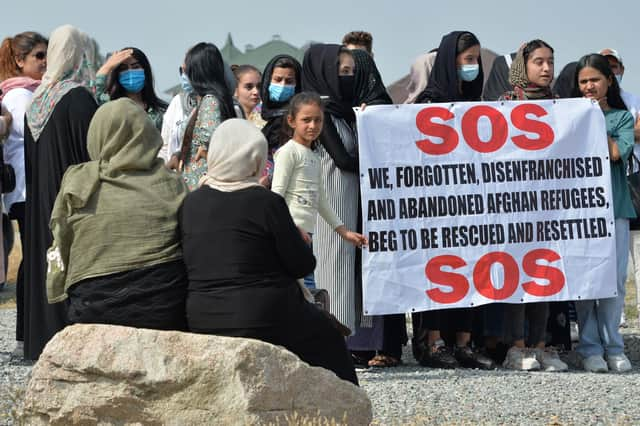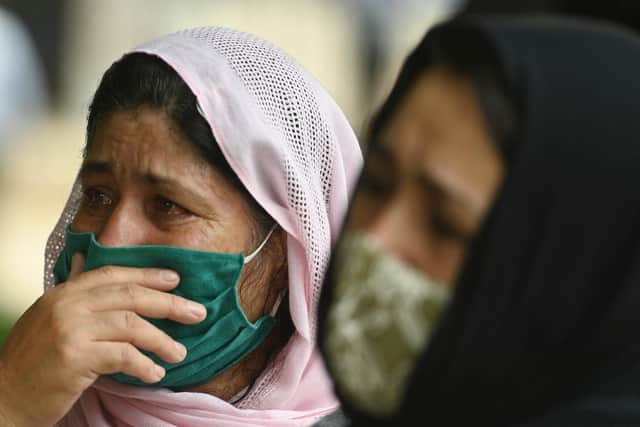Afghanistan crisis shows Robin Cook was right. The West needs an 'ethical foreign policy' – Joyce McMillan


Cook lost no time in outlining what he called his “ethical foreign policy”; and ten days after the election, he issued a mission statement declaring that the Labour government would in future put human rights at the heart of British foreign policy, “which must have an ethical dimension, and must support the demands of other peoples for the democratic rights on which we insist for ourselves”.
The speech was widely welcomed, of course, by human rights groups and campaigners; but it also met with an extraordinarily scornful and vituperative response from those, mainly on the right, who like to equate wisdom with cynicism, and who argued that a foreign policy based on anything other than raw national self-interest would inevitably come to grief.
Advertisement
Hide AdAdvertisement
Hide AdAnd it’s safe to say that many of those who scorned Robin Cook’s ethical foreign policy a quarter of century ago will feel themselves vindicated now, in the heart-breaking shame and chaos of the current withdrawal from Afghanistan by US and UK troops.
It’s now reliably reported from Kabul that both government and employers are asking women workers to stay at home “for their own security”, and that younger women unaccompanied by a male relative are fast disappearing from the streets; and if that shameful situation does not represent a defeat, after an occupation one of whose main stated aims was to prevent a return of the shocking public obliteration of women during Taliban rule in the 1990s, it is hard to imagine what would.
When it comes to analysing the reasons for the West’s humiliation in Afghanistan, though, a much more complex picture emerges. Of course, it suits extreme sovereigntists of both right and left to portray all international interventions in the affairs of nations as inevitably doomed, either by their inappropriate do-gooding, or their implicit neo-colonialism.
The truth is, though, that recent history also records interventions – in Bosnia, Kosovo, East Timor, Sierra Leone – that have undoubtedly saved lives, and ended bloody and seemingly interminable wars, albeit with imperfect settlements.


Even in Afghanistan, there is now a new generation of women who at least have the educational tools to resist the ideology of the Taliban, and to pass that resistance on to their daughters.
The chaos of the Iraq War, in other words, and the current disaster in Afghanistan, are not the inevitable outcomes of international intervention against oppressive regimes; and as global citizens, we owe it to ourselves not to jump to simplistic conclusions, but to try to understand better when such interventions have a high chance of achieving positive results, and when they are doomed to crash and burn, destroying countless innocent people as they go.
Which is where we perhaps return to Robin Cook’s vision of a foreign policy that takes a wider and longer-term view of “national interest” embracing the general need for international peace and security, and therefore for a measure of justice in international dealings.
Throughout the postwar history of the West, and particularly of Britain and the United States, there is a pattern – from Iran in 1953 to Iraq in 2003 – of interventions undertaken for what are presented as pressing humanitarian and security reasons, but which are widely suspected, usually with reason, to be driven in fact by raw western financial interests.
Advertisement
Hide AdAdvertisement
Hide AdEven where there is no wealth to be extracted from the country itself, there is always money to be made from the massive public spending involved in military invasion and occupation; note the huge fortunes clocked up by contracting companies in Iraq after 2003.
And as this week’s searing debate in the House of Commons made clear, every time the UK embarks on foreign policy adventures which are open to such accusations – which lack international sanction, which are tainted by self-interest, which are not supported by a wide range of allies or major international organisations, which lack unambiguous goals, which have no exit strategy, and which often place the armed forces in impossible situations, trying to cover for the mixed motives of their leaders by rebuilding shattered nations with laughably limited resources – it damages its own global standing and reputation in ways which, over the long and medium term, go far beyond calculation.
What the world needs from its most powerful nations, in other words, is a passionate and sustained commitment to human well-being; to providing the economic security, the sustainable environment, the education, the healthcare and the infrastructure that form the basic building blocks of freedom and progress. Yet what it has too often had over the last generation, at least from the West, is a deeply alienating combination of fine words, self-interested motives and extreme military violence, often accompanied by ill-judged attempts to export a crude, get-rich-quick form of neoliberal capitalism that is actively hostile to environmental protection, social justice and good governance.
If this week’s events in Afghanistan mark a staging-post in the final decline of the West, we will therefore have no-one to blame but ourselves, and our departure from those values that underpinned successful global reconstruction after the Second World War.
And if they do not, it will be because, in the cries of the women and children of Afghanistan, we finally hear a wake-up call, and learn, as Robin Cook would have argued, to work seriously with others to deliver a more just and sustainable world – not least in the interests of our own long-term security and freedom, which surely will not survive many more decades of the rank economic injustice and environmental degradation we see around us now, sowing the seeds of rage across our troubled planet, and promising tempests to come.
A message from the Editor:
Thank you for reading this article. We're more reliant on your support than ever as the shift in consumer habits brought about by coronavirus impacts our advertisers.
If you haven't already, please consider supporting our trusted, fact-checked journalism by taking out a digital subscription.
Comments
Want to join the conversation? Please or to comment on this article.
